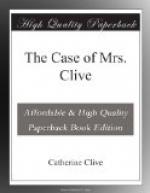excelled also in characters of caprice and affectation, from the high-bred Lady Fanciful to the vulgar Mrs. Heidelberg; in country girls, romps, hoydens and dowdies, superannuated beauties, viragos and humourists; she had an inimitable talent in ridiculing the extravagant action and impertinent consequence of an Opera-singer—of which she gave an excellent specimen in Lethe. Her mirth was so genuine that whether it was restrained to the arch sneer, and suppressed half-laugh, or extended to the downright honest burst of loud laughter, the audience was sure to accompany her [my punctuation].[6]
Mrs. Clive’s stature as a comic actress would, then, seemingly make her a prize for Rich or Fleetwood, but they did their best to thwart her career and happiness at their theaters.
I suspect that their motivation in so doing was fear that her temper, her influence with other actors and her audiences, and her strong loyalty to her profession would hinder their legislated power to control absolutely London theaters, players, and audiences in 1743. Not much investigation is required to see Mrs. Clive at her clamoring best, at various times head to head with Susannah Cibber, Peg Woffington, Woodward, Shuter, or Garrick. Her letters to Garrick show that as late as the sixties she was quite capable of vitriol when she felt that she or her friends were unjustly treated. Tate Wilkinson was surely correct in describing her as “a mixture of combustibles; she was passionate, cross, and vulgar,” often simultaneously.[7] If this were the case in mere greenroom tiffs or casual correspondence, how the ire of “the Clive” must have been excited by the cartelists, who did their utmost to keep her out of joint and almost out of sight.
In 1733, Fielding, who furthered Mrs. Clive’s career by writing and editing parts of his plays for her and publicly praising her as a woman and as an actress, wrote the following encomium on her professional integrity in his “Epistle to Mrs. Clive,” prefatory to The Intriguing Chambermaid:




